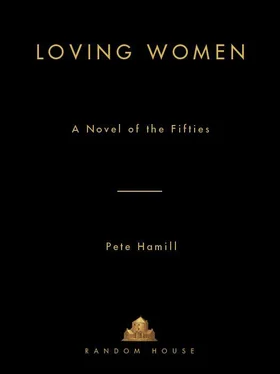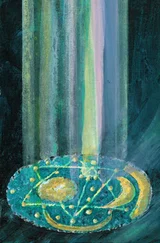There were no lightning bolts. Not that day. Nor on other days and nights. But I couldn’t do that now. Not in a bus. Not in Navy blues, for Christ’s sakes. So I laughed then, and the hard-on vanished and so did my image of Maureen. She was part of my most shameful secret. I was old enough to die for my country, but I was still that most rare and suspicious kind of sailor: a virgin. I could tell this to nobody. But it was true: I’d never slept with a woman. Any woman. I’d fallen in love with a few girls, most terribly and drastically with Maureen Crowley. But because I loved them, I couldn’t sleep with them. And I couldn’t sleep with anyone else, because that would be a betrayal. So I looked out again at the countryside, plunging into America, a sailor without a ship, assigned to shore duty when all my friends were going to sea, a warrior without a war, now that Eisenhower was in and the generals were meeting in Korea to end the fighting. And I felt like a child. But after a while, I felt better: Somewhere down this road, somewhere in the mysterious South, lay my salvation. Here, far from home, I would find my woman.
I remember waking up in the dark, with the bus stopped outside a Howard Johnson’s restaurant. I used the john. I sipped a cup of coffee. Nothing else. I had nineteen dollars left after Christmas leave, and they would have to last me all the way to Pensacola and for a couple of weeks after that, until I’d get paid. At the counter, I tried to get a red-haired waitress to look at me by wearing a wounded look on my face. Like Bogart. But she was too busy for my secret wound, so I picked a newspaper off a stool and read the comics.
I didn’t see Steve Canyon , which I was sure was the greatest comic strip in the world. But the paper did carry Buz Sawyer , the other great one. I’d clipped Canyon and Sawyer from the Mirror and the Journal-American since I was twelve, filing them neatly in #10 envelopes. I filled sketchbooks with copies of the characters, trying to use a brush the way Milton Caniff did on Canyon (and on Terry and the Pirates , which I’d collected in the comic-book editions), trying to draw women the way Roy Crane did in Buz Sawyer . Crane used a special paper called Craftint that I’d read about in a book about cartooning. You used one chemical on the special paper and got a gray tone made of lines going one way. You used the other chemical and the lines came out crosshatched and darker. So Crane’s panels were beautiful, with the two shades of gray, the dead whites, the juicy blacks. But Caniff had better characters. His dialogue was hipper. His women were smarter and sexier, real women who knew the world. Not just the Dragon Lady from Terry , who everybody knew about. Or Burma, singing the “St. Louis Blues.” But Copper Calhoon and Deen Wilderness and April Kane and Feeta Feeta and Fancy, too. Oh yeah, I loved the girl called Fancy. I wanted to go to a movie or a dance with Crane’s women or give them a feel on a beach somewhere. But I wanted to fuck the women drawn by Milton Caniff.
I sipped my coffee at the counter and stared at Buz Sawyer , and tried to enter the story. There were no newspapers in boot camp, so I’d lost track of most of them. I’d asked my father to save the strips for me, but he couldn’t understand why a man old enough to be in the United States Navy would care about such things, so he didn’t bother. He couldn’t even imagine why I wanted to be a cartoonist. That was something like aspiring to be the Pope or the president of Argentina. He didn’t get it. I was Irish. I should be a cop. A fireman. An ironworker. Like the sons of every other donkey who ever landed in Brooklyn.
So I looked at Buz Sawyer as if I were engaged in a monumental act of defiance, hoping that somehow my father would walk into this diner in the middle of America and get furious at the sight. The comics were what we had instead of rock ’n’ roll. I didn’t know the story, but I did recognize the character in the first panel. His name was Harry Sparrow. He had a large bald head, like Doctor Huer in Buck Rogers , and a monocle hanging from his right eye and he was dressed in a cutaway tuxedo complete with striped pants. Harry Sparrow was an international crook. A hustler. A guy who dealt in guns. Somehow he was now involved in a plot to run guns to a Central American country called — I remember the name — Salvaduras. Crane was always putting Sawyer or Easy in some Central American country and owned the region the way Caniff owned China. And in 1952 Central America was still a comical place made up of banana republics, where the revolutions were lots of fun. Nobody called the bad guys the moral equals of the Founding Fathers. Nobody shot peasants or nurses or schoolteachers and called it liberation. Certainly not in Buz Sawyer . In the strip (which I tore out and slipped into The Blue Notebook, where it yellowed for thirty-five-years), Harry Sparrow was listening and smirking as a sexy woman named Fifi talked on the telephone to one of the Salvaduran leaders. Behind them was the gilt frame of a painting.
“More sugar, Fifi,” Harry said to the girl. “More! More! Pour it on!”
“I am ZO unhappy, Adolfo, chèri ,” she was saying to the guy on the other end of the telephone line. Fifi. Chèri . She must be French. “DINNER,” she said. Her right hand was playing with her blond hair. The left hand caressed the telephone. She had a star on her left cheek. Her breasts rose fiercely off her round compact body. “Just the two of us.…”
Then I heard the horn honking outside and I finished my coffee and folded the newspaper and hurried back to the bus.
“Happy New Year,” the driver said.
“Yeah,” I said. “Happy New Year.”
That year we still called black people Negroes, and there was a Negro soldier with pomaded hair sitting in the aisle seat beside mine. He stood to let me in and I nodded at him. He looked like an old welterweight named Tommy Bell, who once knocked down Sugar Ray Robinson. Five other Negro men were dozing on the wide back seat. Two leaned against each other. Another sat with his arms folded. The bus was now full.
I looked up and saw the driver standing beside the steering wheel, looking down the aisle. His lips moved as if he were counting passengers. He leaned forward and said something to the sleeping Negro in the first seat. There was no reaction. The driver squeezed the man’s shoulder, and when the soldier didn’t move, the driver shook him, and then the soldier was suddenly awake, backing away with his hands up, like a fighter. The driver shook his head sadly and whispered to the man. He stood up, blinking, and looked down the aisle. Now the driver was waking the large black woman in the third row. The soldier jerked a duffel bag off the overhead rack, slung it onto his shoulder and came stomping down the aisle.
“Now, where in hell my spose to sit?” he said loudly. “Huh?” He turned to the driver. “Answer me that! There ain’t no seats back here!”
“Jest a minute,” the driver said. The Negro woman was now in the aisle, like a giant plug. Her jaw was loose. She was mumbling. The driver lifted down two shopping bags from the rack.
“I ain’t gonna stand all the way to no Atlanta!” the soldier shouted. “I jest ain’t gonna do it!”
“Hold on,” the driver said. “Jest hold yer hosses.” He waited until the woman took the shopping bags, then he allowed her to lead the way down the aisle. The driver’s eyes squinted; his face seemed more yellow as he scanned the faces in the rear.
“This is boolshit!” the soldier said. “Goddam one hunnid pissent boolshit !”
Читать дальше












